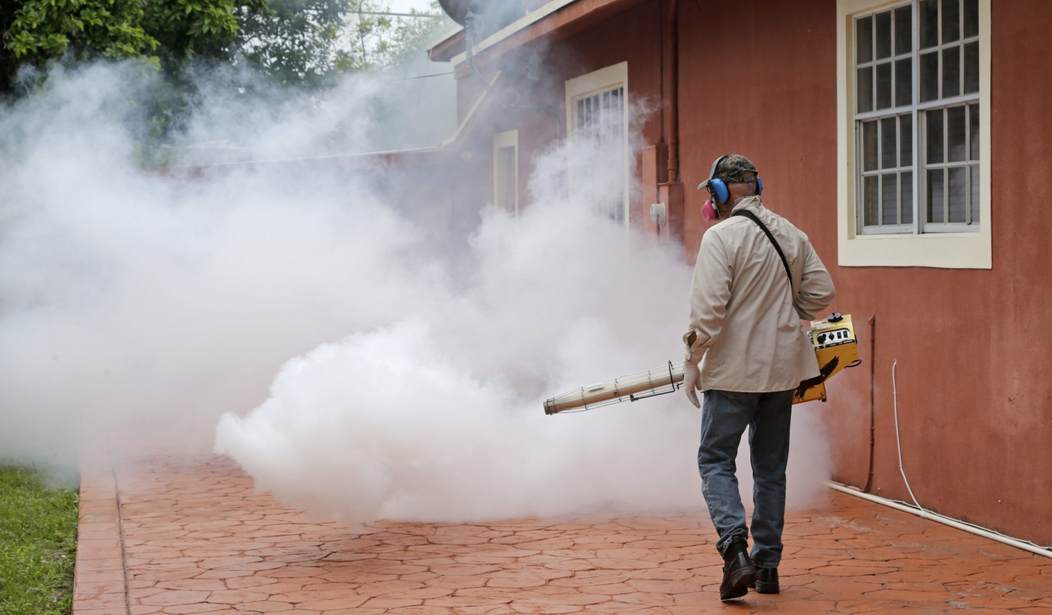The Centers for Disease Control and Prevention distributed $16 million to 40 state health departments today to detect and track the worst effects of the spreading Zika virus, including microcephaly in newborn babies.
That came a day after the agency issued guidance for a section of Miami where the mosquito-borne disease began transmission on U.S. soil.
CDC said the grants “are a stopgap diverted from other public health resources until Zika funds are provided by Congress.” Congress is on recess until Labor Day.
There is no vaccine for the virus, and it can be spread by sexual contact as well as through mosquito bites.
“It is critical to identify infants with birth defects related to Zika virus so we can support them and their families,” said CDC Director Tom Frieden in a statement. “This CDC funding provides real-time data about the Zika epidemic as it unfolds in the United States and territories and will help those most devastated by this virus.”
The CDC released this map Monday showing the area where they have confirmed mosquitoes have been spreading the Zika virus in Miami:
The CDC was sending an emergency response team to the area and issued travel guidelines, including cautioning pregnant women to avoid the area and practicing mosquito protection. Pregnant women who traveled in the area on or after June 15 are advised to consult their doctors and get tested.
Men who have traveled to the area are advised to use condoms for six months to avoid spreading the virus to their partners if they believe a pregnancy could occur. Women trying to get pregnant who’ve been in the region are advised to wait eight weeks.
Frieden said in a conference call Monday that “new assessments of mosquito populations and new test results from this past weekend by Florida public health officials have found persistent mosquito populations and additional Zika infections in the same area.”
“This suggests that there’s a risk of continued active transmission of Zika in that area” north of downtown Miami, the CDC director said.
June 15 is “the earliest known date that one of the cases could have been infected with Zika.”
“We are learning something new about Zika every day. We make decisions to update our recommendations and guidance on a day-by-day basis. What we know about Zika is scary,” Frieden said. “Zika can cause microcephaly, and this is the first time we’ve seen a devastating birth defect result from a mosquito bite and it causes microcephaly even among women who don’t appear to have had any symptoms of Zika infection.”
“But in some ways what we don’t know about Zika is even more unsettling,” he continued. “We don’t know the long-term impact Zika may have on children born to infected mothers who don’t have obvious signs of microcephaly, and these effects may only become apparent months or years in the future. We also don’t yet have ideal ways to control the particular mosquitoes that spread Zika, and we need better methods and tools for mosquito control.”
Frieden admitted that in Miami “aggressive mosquito control measures don’t seem to be working as well as we would have liked,” possibly due to the insecticides being used or small areas of standing water undetected in “a complex urban environment” like the affected area. Mosquitoes may be resistant to “at least two different products from the pyrethroid class” used by vector control.
Frieden said a vector control expert sent by CDC “will work with Florida authorities to begin resistance testing so we can determine whether mosquitoes in this area are susceptible to the insecticides being used.”
“That testing, however, is complex and takes at least a week and sometimes three weeks or more,” he added. “So the mosquito control experts in Florida who have extensive experience with mosquito control as well as our own mosquito control experts are meeting intensively to outline additional measures that may be taken to reduce mosquito populations.”
He said two initial cases of the virus were found at two workplaces within a 150-meter area, then “multiple additional infected individuals were identified” there.
The Aedes aegypti mosquitoes that spread Zika are found in 30 U.S. states.
The United Kingdom issued a travel alert for the U.S. noting that Britons headed for Florida or U.S. territories should “discuss your travel plans with your healthcare provider.”
Florida Gov. Rick Scott said Monday that the number of confirmed cases in the Miami area was at 14.
“[Department of Health] has been testing individuals in three locations in Miami-Dade and Broward Counties for possible local transmissions through mosquito bites. Based on DOH’s investigations, two locations have been ruled out for possible local transmissions of the Zika virus,” Scott said. “DOH believes local transmissions are still only occurring in the same square mile area of Miami.”
As of July 27, the CDC says were are 1,658 reported cases of the mosquito-borne virus in the country linked to travel to countries with transmission within their borders. Fifteen of those cases were sexually transmitted by a partner who had been abroad. There are 4,750 known cases in U.S. territories.
As of July 21, there were 433 cases of the virus involving pregnant women in the U.S. and an additional 422 cases in U.S. territories.










Join the conversation as a VIP Member